The Superman Show: An In-Depth Analysis of Its Legacy
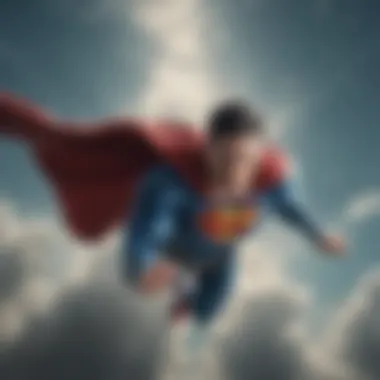

Intro
In today's rapidly evolving entertainment landscape, few characters have maintained their relevance like Superman. Since his first appearance in the 1938 Action Comics #1, Superman has become an enduring icon, representing hope, justice, and the struggle between good and evil. This article seeks to unpack the complex layers surrounding the Superman show, tracing its historical roots, examining its various adaptations over the decades, and exploring the themes and character development that resonate with audiences.
As we venture into the world of the Superman narrative, we will analyze how this legendary character has evolved through different media, including television series, films, and animated features. By understanding the core essence of Superman, we engage with questions about cultural significance, the evolution of heroism, and what it means to be a symbol of hope in today's society.
This journey promises to reveal not only the many incarnations of Superman but also the underlying threads that connect them, proving that while the methods of storytelling may change, the heart of Superman remains steadfast.
Preface to the Superman Show
The Superman Show represents more than just a television series; it embodies a cultural phenomenon deeply rooted in the fabric of popular media. Understanding the full scope of this show is essential for grasping not only the character of Superman himself but also the societal values and themes that have shaped generations. This exploration offers an insightful lens into the evolution of the Superman narrative, allowing fans to appreciate the complexity and richness of this iconic hero's journey.
The Genesis of Superman
The character of Superman was birthed in the midst of the Great Depression, an era laden with despair and uncertainty. Jerry Siegel and Joe Shuster envisioned a hero who could transcend the struggles of ordinary life. Their creation was influenced by their own backgrounds—Siegel, a son of Jewish immigrants, imbued Superman with a sense of justice and hope during a time when the world felt heavy with darkness. This gives Superman a distinct identity that resonates with the idea of the "American Dream," framing him as a beacon of possibility.
The genesis of Superman is not solely a tale of heroism, but also one of resilience. Drawing from various contemporary cultural heroes, such as the strongman archetype found in circus acts, Siegel and Shuster infused Superman with characteristics that embodied strength, but also kindness. They presented a character that could protect the vulnerable, offering an ideal that was sorely missing in the grim reality of the time.
Cultural Roots of the Character
Superman’s roots dig deep into the American psyche, reflecting the hopes, dreams, and anxieties of society when he first emerged. The early 20th century was marked by various upheavals—economic, social, and political—that shaped his character's core values. The cultural backdrop of that period helped define who Superman is at his most fundamental level: a champion of the oppressed, a fighter for truth, and a symbol of moral fortitude.
Reflect upon the identity of Superman; he is often viewed as a metaphorical immigrant. His arrival from Krypton, landing in Smallville, parallels the immigrant experience that many within the United States can identify with. In many ways, Superman embodies the eternal struggle of assimilating into a new world while still holding onto one’s roots. This duality—the blending of his alien origins with Earthly values—creates a rich tapestry that has allowed audiences to connect with him on numerous levels.
In summary, the examination of Superman’s origins and cultural roots serves as a bedrock for understanding the character’s enduring legacy. These early inspirations not only shaped how he is portrayed in various adaptations but also informed the deeper themes present throughout his narratives—from justice and morality to the quest for identity in an ever-changing world.
Historical Context and Development
Understanding the historical context and development of Superman is crucial for grasping how this character not only morphed through the decades but also how he influenced the cultural landscape of the time. The journey of Superman began in the early 20th century and has evolved through significant global events, societal shifts, and changing media landscapes. Analyzing this evolution reveals how Superman serves as a reflection of society's aspirations, anxieties, and evolving ideals. It’s also how the character’s themes resonate deeply with audiences today, making the Superman show not just a series of comic books or episodes, but a cultural artifact with enduring relevance.
Superman's Debut in Comic Books
Superman’s first appearance in "Action Comics #1" in 1938 is a monumental moment in pop culture. Created by Jerry Siegel and Joe Shuster, this issue introduced readers to a hero who transcended human limitations, a concept that struck a deep chord during an era marked by economic hardship and political turmoil. This debut marked not only the birth of Superman but also the dawn of the superhero genre itself.
The character’s extraordinary abilities symbolize hope and the possibility of overcoming adversity. This is evident in his iconic catchphrase: "It’s a bird! It’s a plane! No, it’s Superman!" Soon after his introduction, Superman became a household name, revolutionizing comic books and setting the blueprint for future superheroes. One can appreciate how the style of storytelling in Superman laid the groundwork for the characterization we see in comics today.
Transition to Television
The move from comic books to television in the 1950s created a new realm for Superman. The series “Adventures of Superman,” starring George Reeves, debuted in 1952 and enjoyed immense popularity. This adaptation took the mythos of Superman and expanded it into a family-friendly format that appealed to a broader audience.
Television brought Superman into living rooms across America, cultivating a new generation of fans, while maintaining the core essence of the character. This era not only created iconic moments but also cemented Lois Lane’s role as a strong female character in a world often dominated by male heroes.
The series utilized straightforward storytelling, employing a blend of adventure, morality, and humor, which made the trials of Superman relatable to everyday life. As the show continued, audiences became attached not only to Superman himself but also to the values he embodied: truth, justice, and the American way.
Iconic Moments in Superman History
Throughout the decades, Superman has gifted audiences with unforgettable moments that have resonated through pop culture. From the time he deflected bullets in the classic comic panels to flying through the sky in Richard Donner’s 1978 film, these instances shape the hero's identity.
Let’s highlight a few iconic moments that defined Superman:
- The Death of Superman (1992): A storyline that shook fanbases. It not only introduced a serious tone to the narrative but also prompted discussions about mortality and legacy in superhero lore.
- The "Floats-Through-Buildings" Scene: This visual from the films has often been parodied and homaged in countless media, illustrating Superman's power while also humorously showcasing the everyday dangers his heroism entails.
- Superman Returns (2006): This film aimed to revive interest in the character while paying homage to previous works, reminding us that Superman's struggles are timeless and resonate across generations.
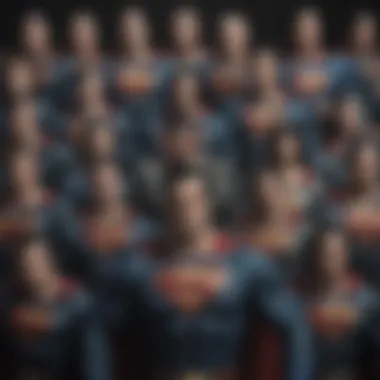
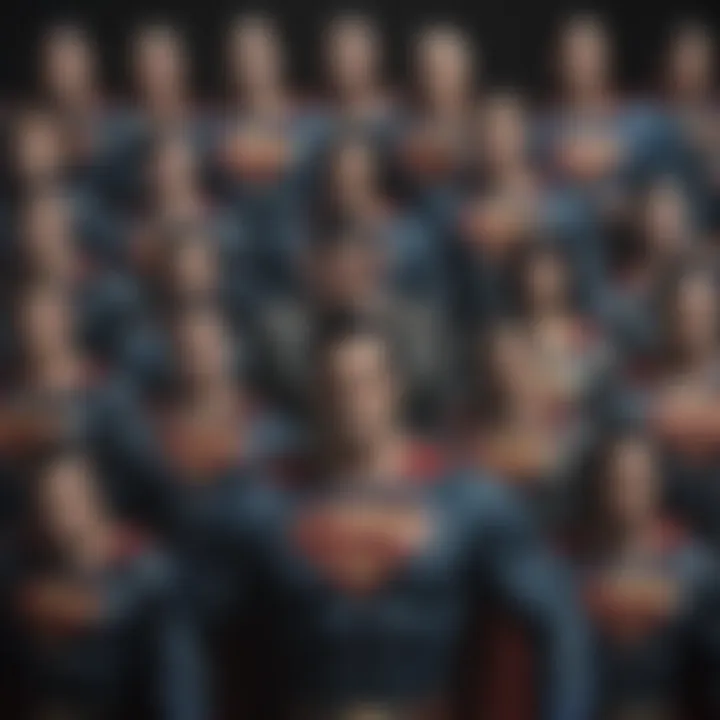
Each of these moments contributes to the legacy of Superman. They show how the character reflects societal changes, veering from pure entertainment to a deeper commentary on human experience, purpose, and morality.
In essence, Superman is not just a figure in a cape. He becomes a mirror, reflecting the values and contradictions of the society that adores him, evolving while staying true to his core.
Understanding these elements of Superman's development is more than a mere recounting of stories; it’s a narrative about cultural growth, a commentary on human nature, and a continual exploration of what it means to be a hero.
Character Analysis
The character analysis of Superman is not just an exploration of abilities and powers; it's about understanding the depth behind the cape. Superman represents more than a hero; he encapsulates ideals and struggles that resonate with the human experience. This section digs into how he embodies strength, justice, and the universal quest for identity while examining the roles played by those close to him.
Superman: The Man and the Myth
Superman’s allure lies in the juxtaposition of his god-like powers and human vulnerabilities. Standing tall as a paragon of virtue, he battles challenges that shape him not just as a superhero, but as a representative of humanity at large. Consider this: while he can fly faster than a speeding bullet and lift skyscrapers, he grapples with issues like loneliness and the weight of expectations. This duality—of being superhuman yet profoundly relatable—is what makes him an enduring figure. His mythos has evolved over the decades, mirroring societal changes and the collective consciousness of the audience.
The Supporting Cast
Lois Lane's Role
Lois Lane is more than just a romantic interest; she embodies strength and intelligence. Serving as a journalist, Lois navigates her path with tenacity and grit. Her character acts as a counterbalance to Superman, pushing him to be accountable not just as a hero but as a partner. What’s particularly compelling is how Lois fights against stereotypes. Instead of being a damsel in distress, she’s often at the center of action, showcasing her own brand of bravery.
The trials that Lois faces further highlight her role. From exposing corruption to challenging Superman on ethical grounds, her narrative choices emphasize autonomy and resilience. Her dynamic with Superman amplifies the theme of partnership in a relationship that thrives on mutual respect. This unique feature of Lois's character acts as an anchor, offering a realistic portrayal of love amid chaos, making her a popular choice for analysis.
The Importance of Lex Luthor
In contrast, Lex Luthor stands as a quintessential adversary, embodying the darker aspects of human nature. His keen intellect and strategic prowess allow him to challenge Superman not merely physically but intellectually. Luthor’s disdain for Superman is steeped in jealousy and rivalry, pushing the narrative into deeper themes of morality and power dynamics. Here lies the crux of Luthor’s importance: he prompts Superman to examine his morality and place in the world.
What makes Luthor a standout character is his complexity. He isn’t simply evil for the sake of chaos; there are layers of ideology that make him a multidimensional foe. He believes he is the hero of his own story, believing that Superman’s existence undermines humanity’s potential. This brings forward an engaging debate about freedom versus control, making Luthor a popular character choice for discussions, thanks to his unique ability to be both a threat and a mirror.
Evolution of Character Traits
The evolution of character traits in Superman is an ongoing narrative of growth and transformation. Initially painted as an invincible savior, over the years, he has morphed into a figure who often questions his morality. Changes in writing styles and cultural context have played significant roles in this progression.
Early versions of Superman presented him as almost infallible, a comforting figure for a war-worn audience. However, as stories delved into personal crises, readers began to see a hero who wrestles with self-doubt and the repercussions of his choices. This evolution illustrates a shift from a clear-cut hero to a figure who embodies the muddiness of modern moral landscapes, making Superman not just a character to admire but one to ponder deeply.
Thematic Elements
The thematic elements of the Superman show provide a rich tapestry that enhances both character depth and narrative intrigue. These themes are not just window dressing; they serve as the backbone of the stories told. Through the lens of Superman, we see reflections of societal values, moral dilemmas, and the struggle for identity, making these themes vital in understanding what Superman represents across various generations.
Themes of Justice and Morality
Superman embodies the classic struggle between good and evil, but what sets his narrative apart is the nuances of justice and morality interwoven throughout. Unlike mere escapist fantasies, Superman's quest for justice often poses difficult questions about right and wrong. For instance, he grapples with decisions that involve collateral damage, displaying a more human side over the typical superhero archetype. This moral complexity resonates well with the audience, sparking discussions around ethical representation in literature.
"Superman is not just a comic book character; he stands for ideals that many aspire to, ideals where justice isn't always cut and dry."
Superman's struggles frequently reflect contemporary societal issues. For example, his response to injustice can often mirror real-world conflicts, such as the fight against oppression and the advocacy for human rights. When he stands up against villains, it can symbolize resistance against tyranny, which has profound implications in today’s world, where social justice movements are gaining traction.
The American Dream and Immigrant Narrative
Another striking element in Superman's narrative is his identity as an immigrant, which can be interpreted as an allegory for the American Dream. Coming from the fictional planet of Krypton, Clark Kent (Superman) represents the promise of a new start, a theme that has been pivotal since his inception.
His journey reflects struggles that many immigrants face: adapting to new environments while holding onto one's roots. This notion compels an exploration of what it means to belong. The character’s quest for acceptance in a world that often fears the unknown resonates deeply with audiences who see their own struggles reflected in his story. Superman’s ability to rise above these challenges, often through acts of heroism, serves as an inspirational narrative that continues to inspire many.
Identity and Duality
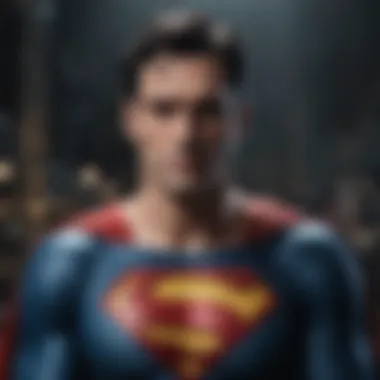
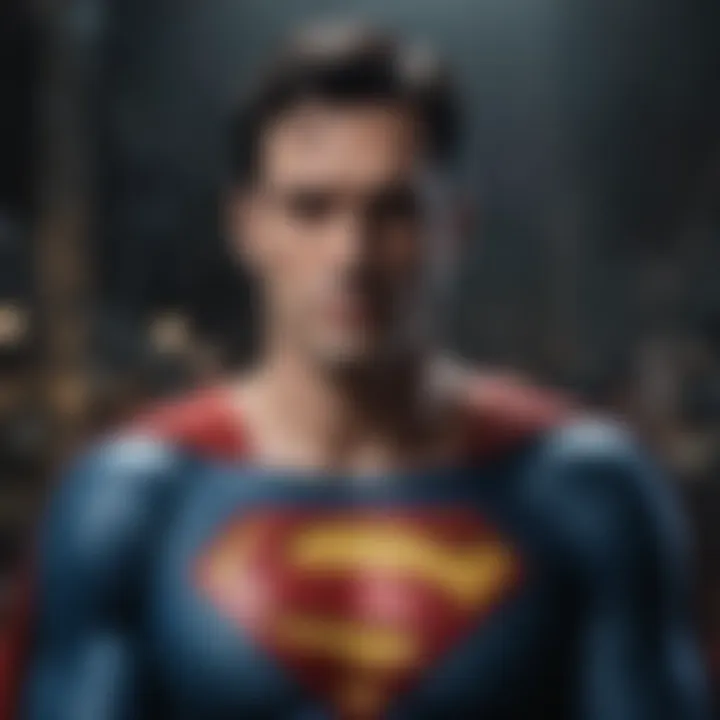
The theme of identity is another significant aspect of Superman's character that invites examination. The duality of Clark Kent and Superman highlights the internal conflict often faced in balancing multiple facets of one’s identity. This duality serves to underscore the universal struggle of self-acceptance while navigating societal expectations.
Clark Kent, as the mild-mannered reporter, contrasts sharply with the powerful Superman, allowing for a dialogue on the masks people wear in their everyday lives. It raises questions: Who are we when we strip away the labels? What does it mean to truly be ourselves?
This often leads audiences to contemplate their own identities amidst societal pressures, encouraging a deeper understanding of the struggle that many face daily. Superman is not only a symbol of strength but also a reminder that vulnerability exists alongside power, shaping a more complex narrative that appeals significantly to contemporary audiences.
In summary, the thematic elements present in the Superman show, including justice, the immigrant experience, and identity, carve a profound understanding of the character that transcends mere entertainment. They connect deeply with the truths of human experience, ensuring that the Superman legacy remains relevant and impactful.
Impact on Popular Culture
The influence of Superman extends far beyond comic books, movies, and television. His presence in popular culture has shaped not only the way superheroes are perceived but also how stories about heroism, sacrifice, and morality are conveyed across various media. This enduring connection between Superman and popular culture reflects a collective narrative about strength, justice, and the ideal of the American hero, resonating deeply with audiences of all ages.
Merchandising and Brand Expansion
Superman’s brand has expanded significantly since his inception. From action figures to apparel, the merchandising landscape surrounding this character tells a fascinating story of commercial success intertwined with cultural relevance.
- Action Figures: Various companies have produced Superman toys, appealing to children and collectors alike. Iconic brands like Mattel and Hasbro have created different versions, each showcasing the character's transformation over the decades.
- Clothing Lines: T-shirts, hoodies, and pajamas featuring Superman's emblem are commonplace. The S-shield symbolizes more than just a character; it represents empowerment, inspiring wearers to exhibit strength in their everyday lives.
- Video Games: Numerous video game adaptations, including the critically acknowledged "Batman: Arkham" series, often include Superman as a pivotal character, showcasing his importance in the gaming world.
Because of these developments, Superman's iconography has become synonymous with heroism. His character's adaptability allows for fresh merchandise that both honors traditional values and keeps pace with modern trends.
References in Film and Literature
Superman's legacy has transcended mediums, inspiring countless references in both film and literature. His story beats influence not just direct adaptations but also various narratives that echo his heroic narrative:
- Film: Numerous films, from the campy 1978 classic starring Christopher Reeve to more contemporary interpretations, pay homage to the original character. Look no further than Zack Snyder’s Man of Steel for a modern retelling that dives into the complexities of identity and duty.
- Literature: Authors have drawn parallels between Superman's challenges and those faced by ordinary individuals. In graphic novels like Alan Moore's Superman: Red Son, the character is reimagined to grapple with political themes, making profound statements about power and morality.
The reference to Superman in various forms highlights his status as an enduring symbol of hope and the complexities that come with being a hero. His narratives prompt audiences to consider their values and beliefs concerning rights and responsibilities.
Influence on Modern Superheroes
The legacy of Superman is also apparent in the way modern superheroes are constructed. Many current characters owe a significant debt to Superman's archetype.
- Character Design: Many heroes, like Captain America or Spider-Man, exhibit characteristics reminiscent of Superman's virtues—strength, resilience, and a moral compass guiding their actions.
- Story Themes: Issues of dual identity and the hero's journey are prevalent in many contemporary superhero narratives. Characters like Wonder Woman and Black Panther showcase struggles that are not unlike those faced by Superman, demonstrating the broad reaching influences of his story.
Ultimately, Superman has laid down a template for heroism in modern storytelling. His principles capture the imagination of creators and audiences alike, underscoring a universal yearning for hope in an often turbulent world.
The embodiment of an ideal hero—strong, compassionate, and unwavering—Superman remains a lodestar for new generations of superhero stories.
By exploring the impact on popular culture, it is evident that Superman's influence is not merely historical; it thrives and evolves with the times, remaining a beacon for heroes, both fictional and real.
Critical Reception
The discussion of Critical Reception holds a crucial spot in understanding the enduring relevance of the Superman narrative through the ages. This sector of the article helps fans, scholars, and general audiences alike captured by the Superman phenomenon to grasp how both the public's and critics’ reactions shaped the way the character and his stories have been told.
Looking back at fan reception, it becomes evident that engagement with Superman transcends mere entertainment; it reflects wider cultural conversations. Fans often bring their personal narratives and experiences to the table when discussing the character, blending their realities with the fictional struggles presented in the stories. Through forums and social media platforms, like Reddit and Facebook, communities form around shared admiration, debates over character arcs, and critiques of adaptations. The emotional investment seen here is instrumental in examining how Superman continues to resonate with different generations.
Fan Reception and Cultural Analysis
Fan reception of Superman over the years has shown an intricate dance between adoration and critique. For many, his persona embodies hope and resilience. The "truth, justice, and the American way" mantra has become a rallying cry for fans who see these virtues as essential, especially in challenging times. However, this ideal has also drawn scrutiny. Some fans argue that the character represents a "white savior" trope, questioning whether Superman’s approach to justice is inherently flawed.
- Key Points of Fan Reception:
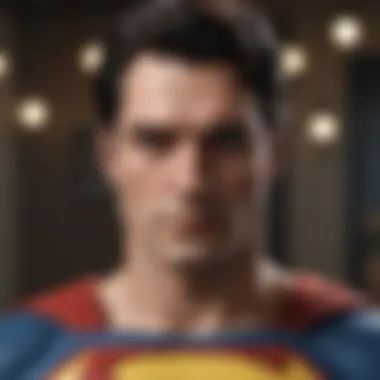
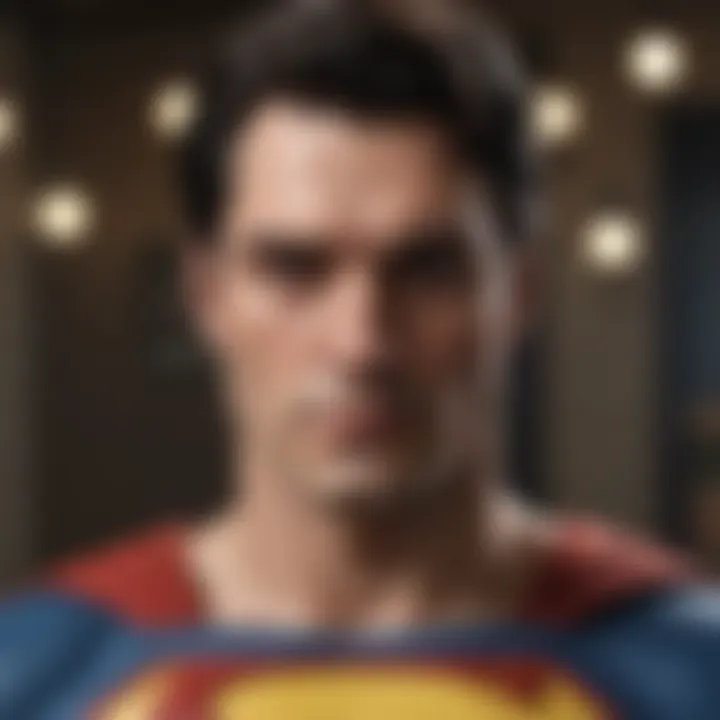
- Emotional connections with Superman through personal stories
- Debates on moral implications of character actions
- Celebrations of global representations and responses to the character's evolution
The cultural commentary extends beyond mere fandom. It highlights how Superman has been used as a vehicle to address critical societal issues such as identity, immigration, and heroism. Examining fan art, cosplays, and fan fiction reveals how audiences express their interpretations, indicating a dynamic interaction with the source material that is both celebratory and interrogative.
Reviews and Critiques Over the Years
As with any long-standing character, Superman has faced a wide spectrum of reviews and critiques, from adoration to disparagement, reflecting the societal context at the time. Early comic book issues were received with immense enthusiasm, establishing a foundation that would lead to widespread acceptance in mainstream culture. However, not all adaptations have pleased critics.
- Decade Highlights:
- 1930s to 1950s: Early comics praised for their creativity
- 1960s: Campy adaptations questioned for lacking substance
- 1980s: "Superman II" received acclaim while some thought it strayed too far from the source material
- 21st Century: Debates surrounding "Man of Steel" on character portrayal and moral complexity
Critiques often revolve around how faithfully adaptations capture the essence of Superman, sparking discussions about his moral compass and the dynamics of power. While some reviews laud his noble qualities—his willingness to sacrifice for humanity—others highlight moments of inconsistency or misalignment with modern ethical standards.
Critical Insight:
"The interpretation of Superman mirrors the social attitudes of the times, revealing as much about society as it does about the character himself."
Conclusively, the way critics and fans respond to Superman plays a significant role in determining his placement in the pantheon of iconic characters. Each critique, whether positive or negative, contributes to a richer understanding of not just who Superman is, but what he represents in the broader cultural scenery.
Future Prospects
The future of the Superman show is a topic filled with possibilities, each ripe for exploration and innovation. As contemporary audiences seek fresh narratives and new interpretations, it's crucial to deliberately consider how the character of Superman will evolve in the rapidly changing landscape of media. The essence of hope and resilience embodied by Superman can be further enhanced through various adaptations, setting the stage for more immersive storytelling.
Next Adaptations and Spin-offs
One of the most exciting dimensions of Superman's future lies in the adaptations and spin-offs being discussed. The animation style that charmed early audiences could see a renaissance. Imagine a gritty, life-like animated series that captures the nuanced struggles of Clark Kent in a world riddled with moral ambiguity. Possible adaptations could take cues from the successful interpretations of other heroes, like how The Boys redefined the superhero genre.
- New Live-Action Series: A series focusing on the younger years of Superman could open up a treasure trove of compelling storylines. Questions about his formative experiences and struggles with identity offer rich narrative soil.
- Animated Projects: Continuing the legacy of the animated series, new films or series focusing on Superman’s lesser-known adventures could pique audience interest. This concept ties nicely to the appreciation of comic spinoffs that explore a hero’s universe in depth.
- Collaborative Crossovers: Bringing Superman into multi-hero narratives like DC Universe’s Crisis Events or collaborative series with other characters could provide fresh perspectives and excitement.
Potential for New Storylines
The potential for new storylines driven by societal issues is another focal point for the future of Superman. Given the current climate, writers can draw on themes that reflect contemporary challenges, adding depth to Superman's always-relevant character.
- Environmental Issues: Exploring Superman’s role in grappling with climate change might make the character resonate with younger viewers, demonstrating his care for the planet. A storyline where he teams up with environmental activists could showcase strength through community.
- Technological Struggles: As technology continues to shape our lives, storylines incorporating artificial intelligence or social media could add a modern touch. Stories about Superman adapting to an AI-driven society or facing villains who manipulate technology for evil could serve as relevant metaphors for current fears.
- Mental Health: Addressing the psychological facets of being a hero can add layers to Superman’s already rich narrative. It could explore vulnerabilities, like the toll that saving the world takes on Superman's psyche and relationships, leading to discussions on mental health awareness.
By embracing both traditional values and contemporary issues, the Superman character can transcend generations, continually reflecting the complexities of human condition.
As we gaze into the horizon of Superman’s narrative future, there’s a palpable sense of anticipation. Adaptations and storylines must balance nostalgia with innovation, delivering a Superman that remains not just a hero, but a relevant figure in the stories we tell.
The possibilities are endless and hint at a new era for the Superman show, one where he can shine brightly against the backdrop of modernity and timelessness.
The End
The conclusion of our exploration into Superman’s enduring legacy serves as a vital touchstone, tying together the numerous threads that encompass this iconic figure. Throughout the various sections of this article, we've dissected everything from Superman's origin stories to his significant impact on pop culture. But at the core of this discussion lies the very idea of what Superman represents and how those representations have evolved yet remained steadfast.
The Enduring Legacy of Superman
Superman's legacy is not simply one of a superhero soaring through the skies; it's a tapestry woven with themes of hope, justice, and humanity. Each adaptation and reinterpretation displays a different facet of this complexity. From his early days in the pages of comic books to the grand narratives on television and film, the character has always resonated with the collective American consciousness and beyond.
- Cultural Symbolism: Superman symbolizes the fight for what is right. In a world often shrouded in cynicism, he stands tall as a beacon of hope and resilience. For many, he embodies the idea that anyone can rise above their challenges and contribute positively to society.
- Adaptability: His stories have shifted to reflect societal changes, addressing issues from war and corruption to personal identity and acceptance. This adaptability ensures that Superman remains relevant, capturing the hearts of new generations.
"What makes Superman more than just a comic book hero is his ability to evolve while staying true to his core ideals."
As Superman journeys through different media, he captures not just the essence of superhuman power but the timeless fight for good over evil, always grounded in his deep connections with humanity.
Reflections on the Hero's Journey
The hero's journey within Superman’s narrative is not merely about battling villains; it's fundamentally about self-discovery and transformation. Superman, born as Kal-El, experiences a myriad of trials that invariably lead him deeper into understanding his purpose. Every story arc highlights his struggle between his Kryptonian heritage and his commitment to humanity.
- Identity Conflict: One of the most potent themes is the conflict between his alien origins and human upbringing. This struggle is emblematic of the universal search for identity and belonging that many face.
- Moral Dilemmas: With immense power comes immense responsibility. Superman’s decisions often test his morals and values, pushing him to navigate the complex landscapes of good and evil in ways that force readers and viewers alike to reflect on their own beliefs.







